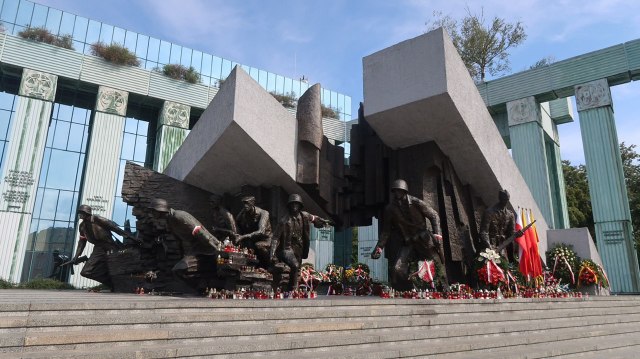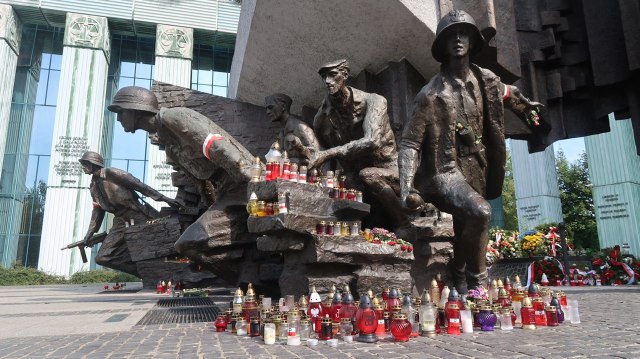On the fifth day of our trip, we finally had some respite from the deluge of WWII details.
Nowa Huta
I had arranged for a private Communism-themed tour of Nowa Huta, Krakow’s centrally-planned socialist district, by Crazy Guides for us. The tour was a little expensive by Polish standards (S$80+/pax for the 4 hour Communism Deluxe tour), but I was intrigued by this write up on their website:
“We treat all our customers equally, like true communists. But on the other hand some are more equal than others. In case you want to feel like a privileged Communist bigwig instead of your typical everyday Socialist worker, then this upgraded Communism Tour might be exactly what you‘re looking for. The tour includes all the same qualities you can find on the other tour but with an added lunch in a vintage “Milk Bar” canteen and an exclusive visit to a real Communist apartment where you can watch an authentic propaganda movie while enjoying a true Polish delicacy, shots of vodka and pickled cucumbers. To top it all you’ll even get a chance to drive the good old Trabant!”
Spoken in true tongue-in-cheek Orwellian fashion à la Animal Farm!
Anyway, we decided to bite the bullet and book the tour in spite of the price because:
(a) I had previously gone on a Communism free walking tour with my dad in Budapest and LOVED it (best free walking tour I’ve ever been on);
(b) M is really interested in that historical period;
(c) I, too, have developed an interest in Communism, especially after watching HBO’s Chernobyl;
(d) we both felt our visit to Poland was incomplete without a glimpse of such a vital part of Polish history; and
(e) we both thought it’d be so interesting to ride a trabant and visit an authentic Communist apartment.
So glad we did because this was one of my happiest experiences in Poland (ok doesn’t say much I guess since the rest of our time was spent at WWII museums/concentration camps).
Our guide came to pick us up in the morning in the promised vintage trabant.
 For the uninitiated, the trabant is a cheap automobile manufactured in the 50s by Communists in East Germany.
For the uninitiated, the trabant is a cheap automobile manufactured in the 50s by Communists in East Germany.
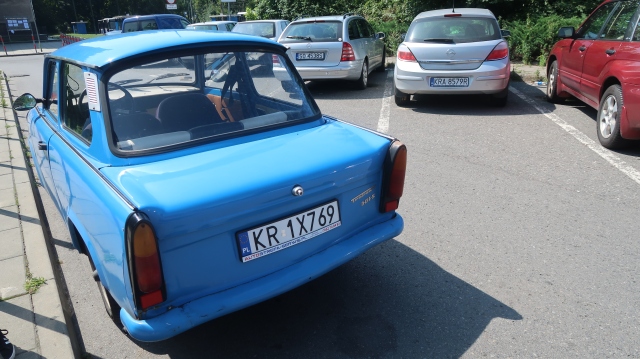
Because of its ill make, it supposedly breaks down all the time, but is so apt for a Communism-themed tour. Fortunately, ours didn’t break down on our trip or we’d have to get out and physically push the car.
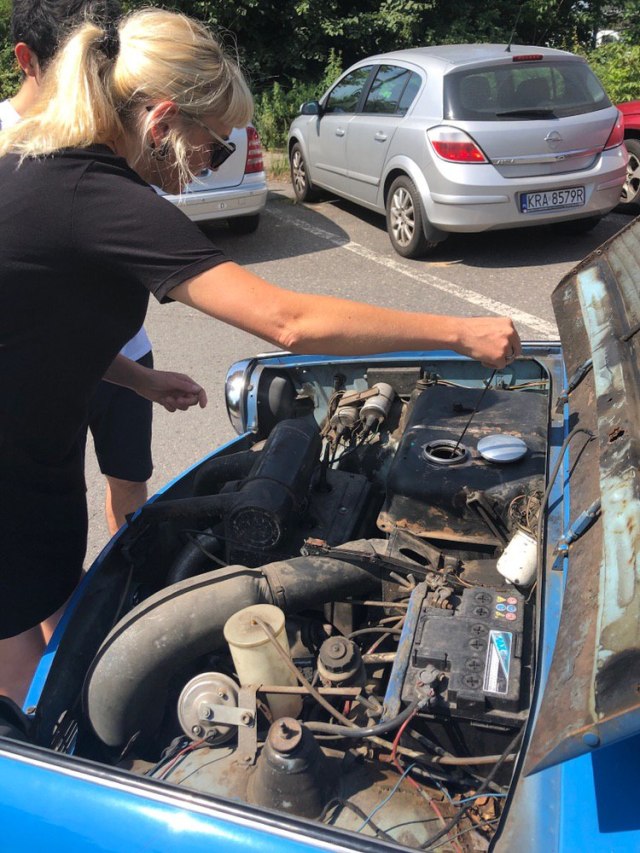 I was quite horrified to see this when our guide lifted the top to fill the petrol. Turned to M and asked, how likely do you think the engine will explode?
I was quite horrified to see this when our guide lifted the top to fill the petrol. Turned to M and asked, how likely do you think the engine will explode?
The inside of the trabant is TINY. I was sitting behind the driver seat and legit had my knee pressed up against the front the entire ride (and I’m only 1.58m). Can’t imagine how claustrophobic it must have been for an entire family of four to be squashed in as they used to be in the old days.
Our guide drove us about an hour or so from Krakow Old Town to Nowa Huta, Krakow’s centrally planned socialist district.
Briefly, after the failed Warsaw Uprising and after the Germans lost WWII, the Soviets swooped in to occupy Poland, which was incorporated as a satellite state of the Soviet Union from 1945 to 1989.
[Side note: I realize most of the Central European states (at least those I’ve visited!) share an unfortunate historical vein: occupation by various empires (e.g. Austro-Hungarian, Ottoman), bloody massacres in WWII, then enforced socialism by the Soviets. Really geographically disadvantaged to be wedged between two superpowers.
Also, am dying to visit Russia next. I mean we’ve spent our whole lives hearing the capitalist vilification of the Soviets; so am really interested in hearing their side of the story.]
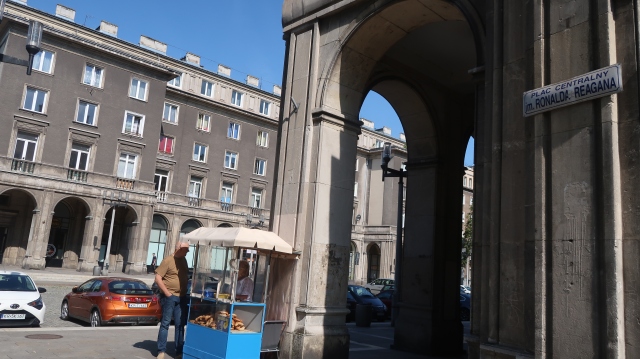
The Soviet Union chose Nowa Huta to be developed into the utopian ideal city and held up as a showpiece beacon of Communism to the rest of Poland. Apparently, there used to a statue of Vladimir Lenin in the central “Avenue of Roses” but the monument was pulled down in 1989 after the fall of Communism. In fact, as a giant “fuck you” to Communisn, the square has now been renamed Plac Centralny im. Ronalda Reagana (Ronald Reagan Central Square) after the president of the world’s largest and most fervent anti-communist bastion.
Our guide also brought us to a souvenir shop which has retained its 50s décor.


We then proceeded to Restauracja Stylowa, a Soviet-themed restaurant which has changed little since the 70s, for drinks.
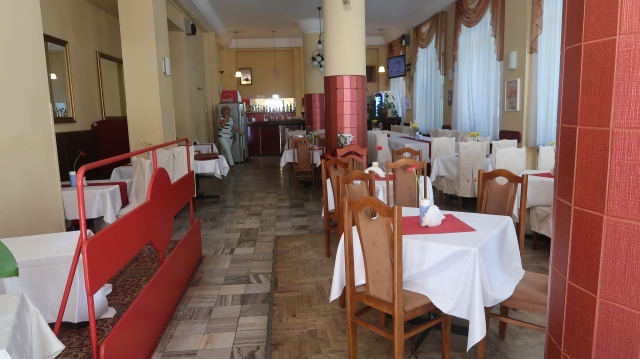
Over drinks at Restauracja Stylowa, our guide produced a photo album and shared her experiences growing up in Communist Poland. Against that backdrop, I could almost picture myself transported back to the 70s.
The guide on my Communism walking tour in Budapest had had horrible experiences growing up in Communist Hungary. His parents had been journalists/activists who were imprisoned for their political views.
However, our Polish guide seemed to have rather fond memories of her childhood in that era. They were allowed to travel to other Soviet Union states, had enough rations for the most part, and occasionally her father would illegally trade in supplies on their travels. Apparently, each Soviet satellite state would have a designated raw material to produce – kinda reminded me of Hunger Games? – so the average citizen would sometimes have to get his supplies on the black market if he ran out of rations. Also, toilet paper was rationed!
According to her, it was a simple life but a fairly happy one. So interesting to have this alternate take on this era. I really, really enjoy learning history through personal anecdotes from the man on the street.
After drinks, she drove us to a former steel factory in Nowa Huta.


And later, we made a stop at the promised Communist-style apartment. Apparently, the tour agency bought (leased?) over the apartment to be retained as a museum of that era. Everything in the apartment has remained untouched.
 When we first entered the apartment, I saw this TV box and couldn’t help exclaiming “omg, big brother is watching!” lol #1984
When we first entered the apartment, I saw this TV box and couldn’t help exclaiming “omg, big brother is watching!” lol #1984
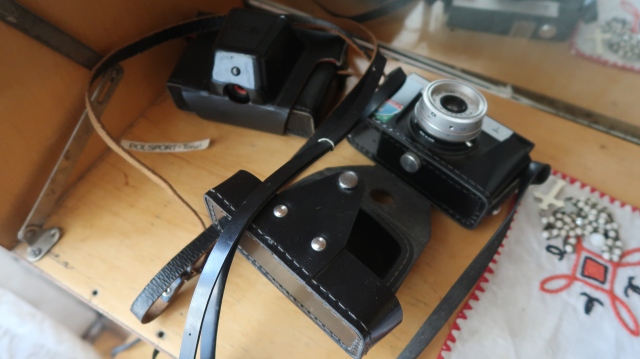
 So interesting to see the 70s interior design
So interesting to see the 70s interior design
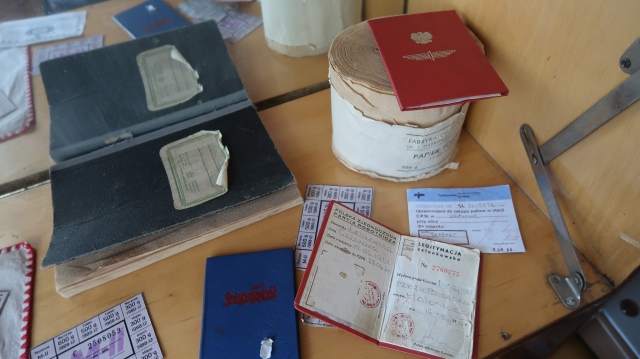 Travel documents?
Travel documents?
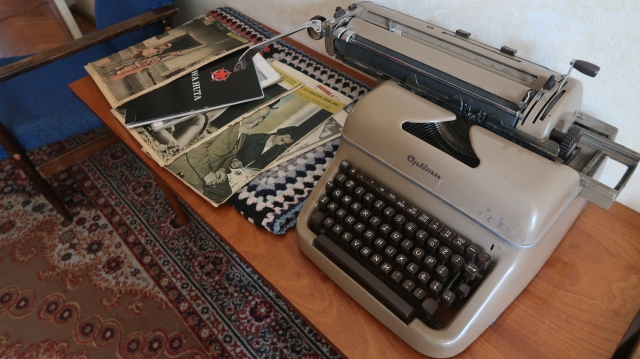 An old typewriter
An old typewriter
 Our guide also poured out some lemonade from that era and put on an authentic Communist propaganda film from for us!
Our guide also poured out some lemonade from that era and put on an authentic Communist propaganda film from for us!
 It felt so surreal to be watching Communist propaganda in an actual Communist apartment sipping Communist-era drinks like a good proletariat lol.
It felt so surreal to be watching Communist propaganda in an actual Communist apartment sipping Communist-era drinks like a good proletariat lol.
After the house tour, our guide took us for lunch (included in the tour) at Bar Mleczny Bieńczyce, my second favourite milk bar in Poland!
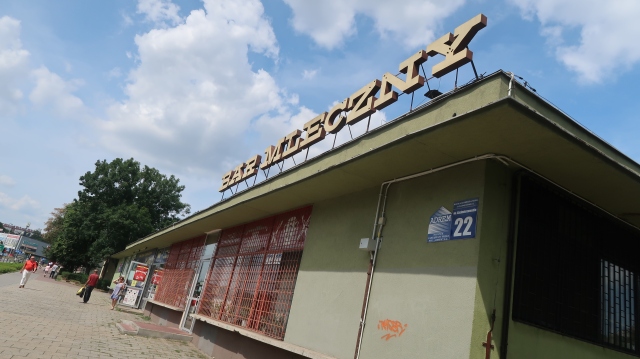
Unlike Milk Bar Tomasza (which I loved), Bar Mleczny Bieńczyce felt grittily authentic. We were the only Asians (likely the only non-Poles) there and it’s difficult to even order there if you can’t speak Polish, so our guide did the ordering on our behalves. 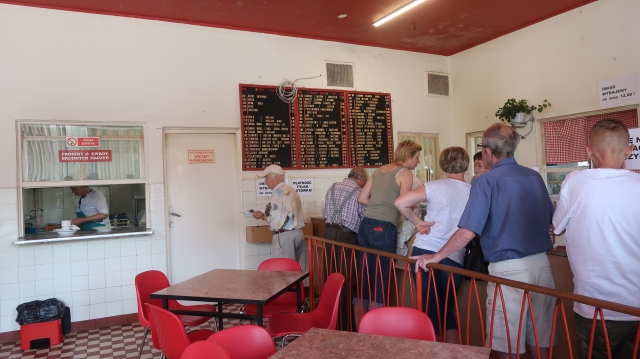
I loved the tuck-shop vibes and the chequered floorboards.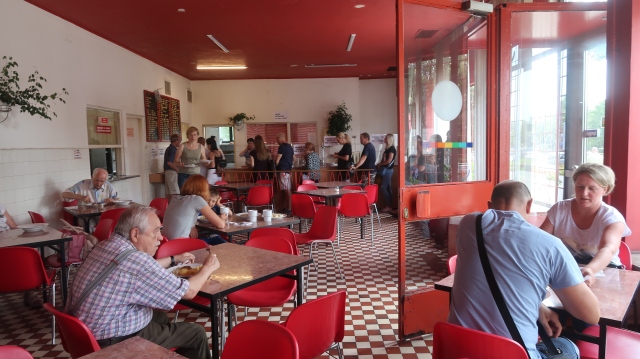
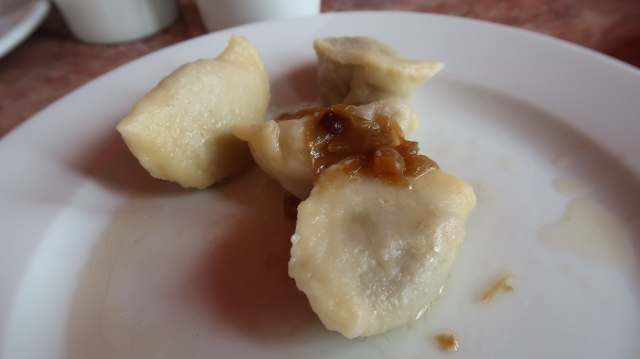 I had pierogi ruskie and pierogi with mushrooms
I had pierogi ruskie and pierogi with mushrooms and blueberry pierogi, all of which were simple but delicious.
and blueberry pierogi, all of which were simple but delicious.
After lunch, our guide drove us back to Krakow Old Town, where we parted ways. In the end, the tour came up to 100ish/pax including tips (not mandatory, but we wanted to because we had such a nice time), but was worth it imo for a different glimpse of Poland.
Wawel Castle
Later, we visited Wawel Castle.



It was so hot and crowded and we were so exhausted, we gave up on Wawel after awhile and went back to our lovely apartment to lie in bed and discuss the War and political ideologies. I hope we didn’t miss much. M actually said our afternoon in was his favourite time of our whole trip
U Babci Maliny
At my colleague’s recommendation, we had dinner later that night at U Babci Maliny (Polish for “At Grandma’s Raspberry”), a restaurant hidden in the cellar of one of the buildings in Krakow Old Town.
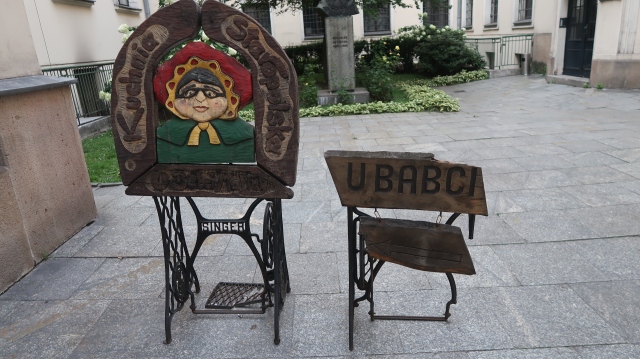
I really loved the charmingly kitschy décor and the hearty, reasonably-priced, generous portions of food there.

I ordered a mushroom dish on my colleague’s recommendation. Also, earlier that day, our guide mentioned that Poles are big on mushrooms, and if you ever see random passers-by picking mushrooms overseas, they are likely to be Poles lol. Can understand why after I bit into the mushrooms though – they were delicious! So succulent and earthy; I never knew the simple mushroom could taste so good!

Also had fried potato pancake, another favourite Polish dish of mine.









 At Birkenau, we saw the notorious train tracks on which Jews from all over Europe once arrived to be slaughtered like cattle. In fact, the very train cars used to cart them into Auschwitz were cattle wagons, built for the shipment of LIVESTOCK.
At Birkenau, we saw the notorious train tracks on which Jews from all over Europe once arrived to be slaughtered like cattle. In fact, the very train cars used to cart them into Auschwitz were cattle wagons, built for the shipment of LIVESTOCK. These Jews had been herded out from the Ghettos and packed like sardines into windowless cattle cars like this. Many did not survive the journey.
These Jews had been herded out from the Ghettos and packed like sardines into windowless cattle cars like this. Many did not survive the journey.

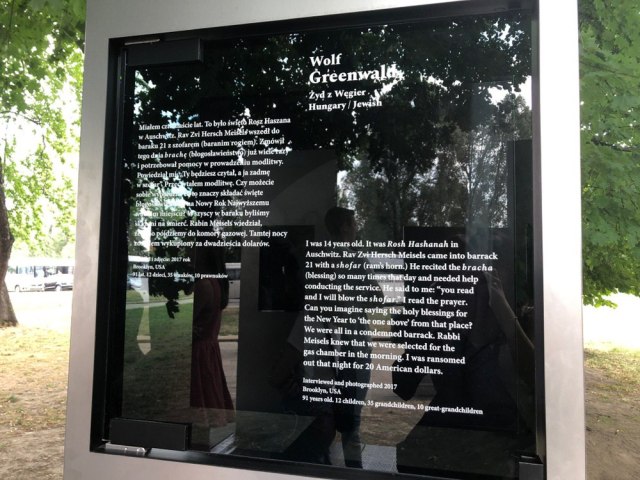 “Can you imagine saying the holy blessings for the New Year to ‘the one above’ from that place?”
“Can you imagine saying the holy blessings for the New Year to ‘the one above’ from that place?”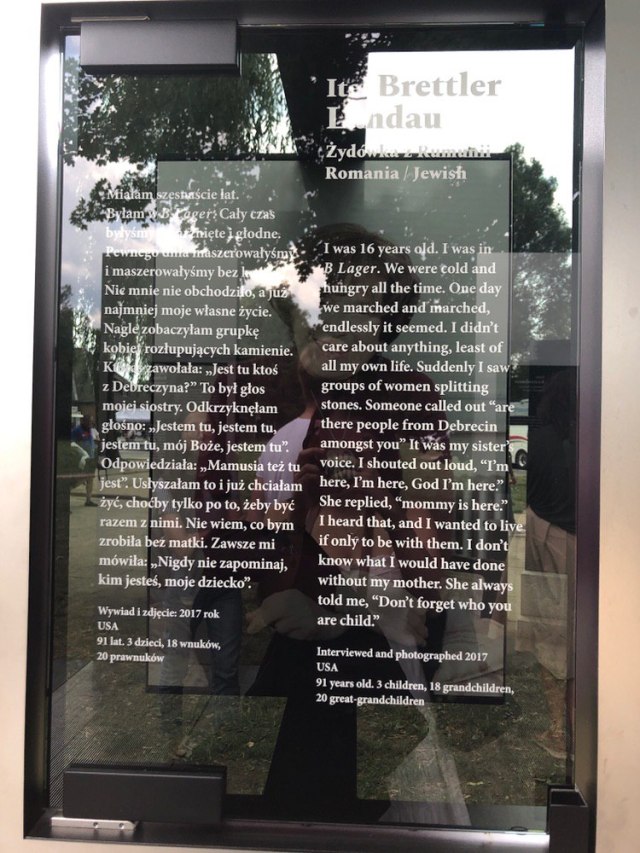
 “I knew if she died, I would die.”
“I knew if she died, I would die.”



